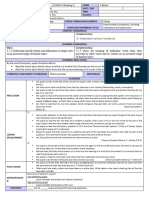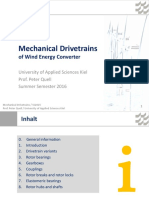Lesson 56
Lesson 56
Uploaded by
AliisaAkamaiCopyright:
Available Formats
Lesson 56
Lesson 56
Uploaded by
AliisaAkamaiOriginal Title
Copyright
Available Formats
Share this document
Did you find this document useful?
Is this content inappropriate?
Copyright:
Available Formats
Lesson 56
Lesson 56
Uploaded by
AliisaAkamaiCopyright:
Available Formats
WEEK/LESSON NO.
32 LESSON 56 (Reading 9) FORM 4A
SUBJECT English DATE / DAY 26/10/2023 Thursday
UNIT 5 TIME 1030 - 1200
TOPIC Globetrotting DURATION 1 Hour 30 Minutes
THEME People and culture
MAIN SKILL Reading CROSS-CURRICULAR ELEMENTS Global Sustainability
21ST CENTURY LEARNING Think-pair-share LANGUAGE/GRAMMAR talking about travelling experiences; sequencing
TECHNIQUE(S) FOCUS: past action and events; words and phrases
describing travelling through rain forests
CONTENT STANDARD(S)
Main: Complementary:
3.1 Understand a variety of texts by using a range of appropriate reading strategies to construct meaning
2.1 Communicate information, ideas, opinions and feeli
LEARNING STANDARD(S)
Main: Complementary: 2.1.4 Explain and justify own point of view
3.1.2 Understand specific details and information in extended texts on a wide range of familiar topics
LEARNING OBJECTIVE(S)
By the end of the lesson, pupils should be able to:
Scan the text and answer five questions based on the text.
Discuss at least one question related to globetrotting.
Full Blast Plus 4
Student’s Book p67-69
Teacher’s Book p67-69
FORMATIVE ASSESSMENT TECHNIQUE(S) The Exit Ticket MATERIAL(S)
Print or digital resources
Computer lab or access to computers (tablets or
laptops) if using digital research tools
ACTIVITIES
Ask pupils to look at the picture on the page and tell you what it shows (a traveller looking at his map and
trying to find out where he is going. etc.). Elicit answers.
Draw pupils' attention to the title of the module in connection with the picture and help them deduce the
meaning of the word globetrotting (travelling in many countries around the world).
PRE-LESSON
Ask pupils to tell you what they think the module will be about. Elicit answers.
Ask pupils the questions in the Discuss section.
Elicit answers.
(Student’s book p67- Discuss)
LESSON
DEVELOPMENT 1)
Ask pupils to look at the pictures accompanying the text and tell you what they can see (a map, a scorpion, a
jungle, a hiking boot in water /mud).
Elicit answers.
Ask pupils to guess what the text will be about.
Elicit answers.
Ask pupils to read through the text and underline unknown words at the same time.
Ask pupils to read through the three titles and check understanding.
Allow pupils some time to choose the best title for the text.
Check the answers with the class.
Ask pupils to provide justification for their answers.
(Student’s book p68 Activity B)
2)
Ask pupils to read through the questions 1-5 and the respective answers and check understanding.
Read out and explain the TIPS.
Have pupils do the activity.
Check answers with the class. If necessary, ask pupils to provide justification for their answers.
(Student’s book p69 Activity
C)
Prepared By: Maya Hafizza binti Osman
Week 32, 2023.
3)
Ask pupils the questions and initiate a short discussion.
1. Would you like to try what Ed Stafford did? Why/ Why not?
2. Do you know of any other people who have been on incredible expeditions?
3. What can the achievement of Ed Stafford teach us?
Ask pupils to provide justification for their answers.
(Student’s book p69 Activity E)
Ask pupils to identify with their talk partner(s) at least three new words or phrases that they have learned in
POST-LESSON relation to travelling.
When pupils are ready, collect and share words/phrases as a whole class.
By amount of teacher’s support:
Low-proficiency pupils
DIFFERENTIATIO
- pupils complete the tasks(s) with teacher’s guidance.
N
High-proficiency pupils
- pupils complete the tasks(s) on their own.
TEACHER’S
REFLECTION
CHECKED BY: ………………………………….………. DATE: ………………………….……………….
Prepared By: Maya Hafizza binti Osman
Week 32, 2023.
You might also like
- CRISC AiODocument272 pagesCRISC AiOJetob100% (6)
- OptiX OSN 9800 Operation and Maintenance Training (Part 1)Document160 pagesOptiX OSN 9800 Operation and Maintenance Training (Part 1)Bahaa Alaboud100% (1)
- Daily Lesson Plan-Oral CommunicationDocument3 pagesDaily Lesson Plan-Oral CommunicationDianne Mae Daga100% (1)
- Unit 6 Time OutDocument14 pagesUnit 6 Time OutAziah AzizNo ratings yet
- Eei Lesson Plan 3Document4 pagesEei Lesson Plan 3api-324796495100% (2)
- People v. JaurigueDocument7 pagesPeople v. JaurigueAndrei Anne PalomarNo ratings yet
- LevisDocument2 pagesLevisSharad PriyamNo ratings yet
- Week 25Document24 pagesWeek 25NURBAHIYYAH SYAZWANI BINTI ZAINURIN KPM-GuruNo ratings yet
- p84 Activity 1 & 2) : Teachers' HandoutDocument1 pagep84 Activity 1 & 2) : Teachers' HandoutFaryz Tontok Tinan 오빠No ratings yet
- 20.6.22 (Mon)Document4 pages20.6.22 (Mon)Siti AthirahNo ratings yet
- Lesson 50Document2 pagesLesson 50AliisaAkamaiNo ratings yet
- 1.6.22 (Wednesday)Document4 pages1.6.22 (Wednesday)Siti AthirahNo ratings yet
- p84 Activity 1 & 2) : Teachers' HandoutDocument1 pagep84 Activity 1 & 2) : Teachers' HandoutFaryz Tontok Tinan 오빠No ratings yet
- Lesson 14Document1 pageLesson 14Leo DingNo ratings yet
- Lesson 51Document1 pageLesson 51Madam Rushila RahimiNo ratings yet
- English Download Student's Book p64Document1 pageEnglish Download Student's Book p64Siti Athirah100% (1)
- Full Blast Plus 4: Student's Book p71 Teacher's Book p71Document2 pagesFull Blast Plus 4: Student's Book p71 Teacher's Book p71Siti AthirahNo ratings yet
- Lesson 78Document1 pageLesson 78Khairul HafiziNo ratings yet
- Is Used To Refer To Crime Fiction.) .: English DownloadDocument1 pageIs Used To Refer To Crime Fiction.) .: English DownloadSiti AthirahNo ratings yet
- Lesson 26Document1 pageLesson 26farah famiNo ratings yet
- Lesson 1Document1 pageLesson 1Hafiz AbdullahNo ratings yet
- Lesson 72Document2 pagesLesson 72Madam Rushila RahimiNo ratings yet
- Lesson 79Document1 pageLesson 79Madam Rushila RahimiNo ratings yet
- Unit 5 GlobetrottingDocument14 pagesUnit 5 GlobetrottingSainah Manigoth100% (1)
- Full Blast Plus 4: Student's Book p69-70 Teacher's Book p69-70Document2 pagesFull Blast Plus 4: Student's Book p69-70 Teacher's Book p69-70Siti Athirah0% (1)
- Lesson 93Document1 pageLesson 93Madam Rushila RahimiNo ratings yet
- Unit 4Document20 pagesUnit 4fatinzahari93No ratings yet
- Minggu 11Document42 pagesMinggu 11BHAVANI A/P RAMASAMY RAMANATHAN MoeNo ratings yet
- Lesson 5Document1 pageLesson 5Leo DingNo ratings yet
- Success Criteria: Pupils Can: 21st Century Activities & SkillsDocument1 pageSuccess Criteria: Pupils Can: 21st Century Activities & SkillsSyasya MudaNo ratings yet
- Preposition Going PlacesDocument9 pagesPreposition Going PlacesAiman IzharNo ratings yet
- Lesson 65Document1 pageLesson 65Madam Rushila RahimiNo ratings yet
- Lesson 1Document1 pageLesson 1Leo DingNo ratings yet
- Lesson 7Document2 pagesLesson 7Leo DingNo ratings yet
- 2 - 21 March 24Document2 pages2 - 21 March 24g-52405257No ratings yet
- Minggu 11Document41 pagesMinggu 11BHAVANI A/P RAMASAMY RAMANATHAN MoeNo ratings yet
- Lesson 105Document2 pagesLesson 105Hafiz AbdullahNo ratings yet
- Skills Pedagogy (Strategy/Activity) : Content StandardDocument3 pagesSkills Pedagogy (Strategy/Activity) : Content StandardVaigeswari ManiamNo ratings yet
- Lesson 4 English Form 3 Close UpDocument1 pageLesson 4 English Form 3 Close Upg-28512796No ratings yet
- Unit 5 A Place To Call Home (Week 15 - 17 2023)Document10 pagesUnit 5 A Place To Call Home (Week 15 - 17 2023)Amelia YampingNo ratings yet
- RPH - WK42 2024Document31 pagesRPH - WK42 2024g-28512796No ratings yet
- RPH Form 4 WEEK 7Document5 pagesRPH Form 4 WEEK 7Matthew MantraNo ratings yet
- 27 MAC 2023 3P 3B 1D 1G (AutoRecovered)Document6 pages27 MAC 2023 3P 3B 1D 1G (AutoRecovered)Malviano AlbertNo ratings yet
- Lesson 6 TS25Document8 pagesLesson 6 TS25Eyzma MuradNo ratings yet
- Think 9 UnitDocument19 pagesThink 9 UnitРаушан АскарNo ratings yet
- Think 9 UnitDocument25 pagesThink 9 UnitРаушан АскарNo ratings yet
- RPH Intan 1.2Document22 pagesRPH Intan 1.2Intan NaziraNo ratings yet
- Class 11th English Snapshot Chapter-The Address Lesson PlanDocument11 pagesClass 11th English Snapshot Chapter-The Address Lesson PlanSurya Krishna MohanNo ratings yet
- Unit 3 The Wonders of NatureDocument5 pagesUnit 3 The Wonders of NatureAmelia YampingNo ratings yet
- 6 GradeDocument11 pages6 GradeЗайтунам ИлиеваNo ratings yet
- Lesson 2 English Form 3 Close UpDocument2 pagesLesson 2 English Form 3 Close Upg-28512796No ratings yet
- Lesson 77Document1 pageLesson 77Khairul HafiziNo ratings yet
- Unit 5 GlobetrottingDocument16 pagesUnit 5 GlobetrottingyayaNo ratings yet
- MON-FRI (4) 3B Week 39Document2 pagesMON-FRI (4) 3B Week 39jennaNo ratings yet
- Block 5, Week 2, Lesson 4Document2 pagesBlock 5, Week 2, Lesson 4Gehad MohamedNo ratings yet
- Action Research FinalDocument13 pagesAction Research Finalapi-383430885No ratings yet
- Choose An Item.: (Kandungan Tambahan)Document3 pagesChoose An Item.: (Kandungan Tambahan)herianamsNo ratings yet
- Latest Form 4 Lesson Plan (Cefr/kssm English Daily Lesson Plan) RPH Bahasa Inggeris Sekolah Menengah Tingkatan 4 TerkiniDocument2 pagesLatest Form 4 Lesson Plan (Cefr/kssm English Daily Lesson Plan) RPH Bahasa Inggeris Sekolah Menengah Tingkatan 4 Terkinierfolg.prominenceNo ratings yet
- w10 Bi 4utm, 4upm, 4 UkmDocument10 pagesw10 Bi 4utm, 4upm, 4 UkmNur Hafiza Hj BakriNo ratings yet
- Week 20 RPHDocument22 pagesWeek 20 RPHNURBAHIYYAH SYAZWANI BINTI ZAINURIN KPM-GuruNo ratings yet
- RPH Form 4 WEEK 9Document10 pagesRPH Form 4 WEEK 9Matthew MantraNo ratings yet
- Form 2 Lesson Plan Use 5Document2 pagesForm 2 Lesson Plan Use 5Shahana GovindarajuNo ratings yet
- The Old Man and the Sea - Literature Kit Gr. 9-12From EverandThe Old Man and the Sea - Literature Kit Gr. 9-12Rating: 4 out of 5 stars4/5 (3)
- Jeopardy - Dna Rna and MitosisDocument27 pagesJeopardy - Dna Rna and Mitosisapi-260690009No ratings yet
- Understanding 10G To 400G Ethernet Speeds Transceivers and Selecting The Correct Fiber Optic Connectivity v2 1Document23 pagesUnderstanding 10G To 400G Ethernet Speeds Transceivers and Selecting The Correct Fiber Optic Connectivity v2 1huanyong wangNo ratings yet
- Mechanical-Drivetrains Kap.1 SS2016 30.03.2016Document62 pagesMechanical-Drivetrains Kap.1 SS2016 30.03.2016André Sento Sé BarretoNo ratings yet
- Prayers of The FaithfulDocument2 pagesPrayers of The Faithfulclaudia1920No ratings yet
- Physician Marketing For AudiologyDocument7 pagesPhysician Marketing For AudiologyMaria RiccobonoNo ratings yet
- Poweredge t610 Technical GuidebookDocument58 pagesPoweredge t610 Technical GuidebookPeter AmmenNo ratings yet
- Magnesium Sulfate HeptahydrateDocument7 pagesMagnesium Sulfate HeptahydrateLord Lee CablingNo ratings yet
- Retinitis Pigmentosa: Stephen H. Tsang Peter M. J. Quinn EditorsDocument402 pagesRetinitis Pigmentosa: Stephen H. Tsang Peter M. J. Quinn EditorsLeticia LunaNo ratings yet
- TT - NGỮ ÂM-ÂM VỊ HỌC Thảo Thủy TrangDocument22 pagesTT - NGỮ ÂM-ÂM VỊ HỌC Thảo Thủy TrangLưu Thị Phương ThảoNo ratings yet
- Sample Final Test - KEYDocument1 pageSample Final Test - KEYlee hoangNo ratings yet
- Resume AssignmentDocument2 pagesResume Assignmentapi-472648158No ratings yet
- Stories of Special Children, Paknaan, Mandaue, CebuDocument21 pagesStories of Special Children, Paknaan, Mandaue, CebuErlinda Posadas100% (1)
- Carlos vs. AngelesDocument2 pagesCarlos vs. AngelesHanamichi Sakuragi Goku San0% (1)
- Lesson 1Document11 pagesLesson 1Analyn Bereño ParbaNo ratings yet
- Article of FaithDocument9 pagesArticle of FaithStoryKing100% (2)
- 4UFM E3 LO3 Resource v2Document19 pages4UFM E3 LO3 Resource v2Ruchira PereraNo ratings yet
- Rabbits ThesisDocument6 pagesRabbits Thesisiinlutvff100% (2)
- Pace 349 ScheduleDocument3 pagesPace 349 Schedulesaxman011100% (1)
- Hanuman Poster Art and Postcolonial AnxietyDocument43 pagesHanuman Poster Art and Postcolonial AnxietyAlessandra ConsolaroNo ratings yet
- CTM 2Document9 pagesCTM 2AGABA DANCUNNo ratings yet
- PE02 CO1 Module Volleyball - PanguitoDocument18 pagesPE02 CO1 Module Volleyball - PanguitoCHRISTIAN MATTHEW DELA CRUZNo ratings yet
- The Constitutional Validity of The NIA Act FinalDocument5 pagesThe Constitutional Validity of The NIA Act FinalBrijbhan Singh Rajawat100% (1)
- User Account Information Technology SOPDocument16 pagesUser Account Information Technology SOPYuyu YcNo ratings yet
- Apac Financial Services Private LimitedDocument9 pagesApac Financial Services Private LimitedPari SethNo ratings yet
- 00 Midgard RPGDocument2 pages00 Midgard RPGPaul SavvyNo ratings yet
























































































